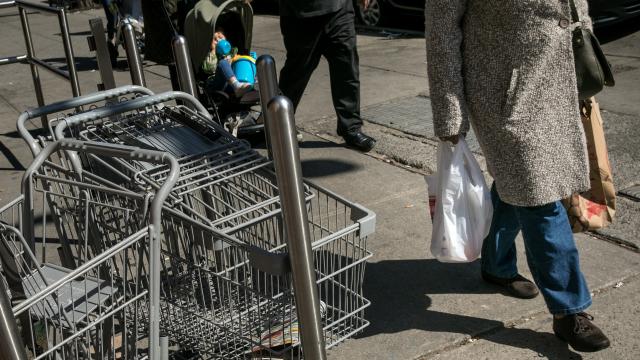The covid-19 pandemic is forcing many of us to change our best-intentioned behaviours. We’re withholding physical affection, even when our loved ones are in distress. We’re not patronising our favourite bars, even though they’re struggling to stay afloat.
In some places, people are also using single-use plastic bags, despite the years-long effort to phase out disposable plastic materials. All over the U.S., officials are grappling with concerns that reusable bags often go unwashed and can therefore easily spread covid-19. But even though these concerns are unfounded, the fossil fuel industry has latched onto them to push policy that benefits it and locks us into a cycle of using more wasteful plastic.
Last week, Maine, which was set to begin enforcing a plastic bag ban on April 22, announced it will allow disposable bags to be used until January 2021. On Wednesday, Boston officials announced that the city will temporarily rescind its bag ban, too. New Hampshire went one step further”it’s not only allowing single-use grocery bags, but enforcing a temporary ban on reusable ones for the duration of the covid-19 outbreak.
“Our grocery store workers are on the front lines of #COVID19, working around the clock to keep NH families fed,” New Hampshire’s Republican Governor Chris Sununu said on Twitter. “With identified community transmission, it is important that shoppers keep their reusable bags at home given the potential risk to baggers, grocers, and customers.”
The implication, of course, is that single-use plastic bags will not spread covid-19 as much as their reusable counterparts. That’s also the narrative that the plastics industry is pushing. Groups funded by petrochemical companies, including the Manhattan Institute and the Competitive Enterprise Institute, have both called to ease restrictions on bag bans to preserve health. And on Wednesday, Politico obtained a copy of a letter that the trade group Plastics Industry Association sent to the U.S. Department of Health and Human Services.
“Now more than ever, we are seeing the impacts of those local and state laws restricting the use of single-use products,” the letter says. “We ask that the department speak out against bans on these products as a public safety risk and help stop the rush to ban these products by environmentalists and elected officials that puts consumers and workers at risk.”
There is research showing that using reusable bags can transmit some illnesses. One 2010 study, published by Loma Linda University and the University of Arizona and cited by the Plastics Industry Association in their recent letter, found that reusable bags can carry bacteria. But of course, covid-19 is a virus, not a bacteria.
“Industry groups are obscuring that distinction,” Ivy Schlegel, a senior research specialist at Greenpeace, told Earther. “Intentionally or unintentionally the result [is] confusion for the public.” She also noted that the 2010 study was funded in part by the American Chemistry Council, which represents plastics producers, and that it only examined reusable plastic bags, not cotton ones, which are also common.
There’s no definitive research that shows how long the novel coronavirus stays on cotton or other fabrics”materials out of which reusable bags are often made. There is, however, research showing it can remain on plastic A study published in the New England Journal of Medicine last week indicates that the virus could be stable on plastic surfaces for two or three days.
Sarah Fortune, chair of the Department of Immunology and Infectious Diseases at Harvard’s T.H. Chan School of Public Health, said that even though there’s no evidence supporting the moves toward single-use plastics, she understands them.
“I do not think that there is any evidence that this is a significant mode of transmission or that one bag is better than another,” she told Earther in an email. “That said, the grocery workers are critical… and so it may be worth it to reduce their anxiety.”
Still, that safety may be an illusion. “There’s sort of a myth that plastic is the ultimate pinnacle of sanitation, but that’s not true,” said Schleigal.
In fact, plastic poses a threat to public health both on its own and in the context of the current global pandemic. Most plastic is made from fossil fuels, which release toxic emissions when they’re extracted. Petrochemical plants which turn those fuels into plastic also emit harmful pollutants, and so do incinerators where plastics are burned once they’re thrown out. That can lead to major respiratory issues, cardiovascular disease, and cancer for people living in those areas. And those people in turn are particularly vulnerable to covid-19.
“When you’re looking at the health impacts of plastic, you have to consider the whole life cycle,” Judith Enck, former Environmental Protection Agency regional administrator under President Obama and founder of Beyond Plastics, told Earther.
The fossil fuel industry’s attempt to push plastic use and production started long before the covid-19 pandemic. In recent years, they’ve pushed to build new plants to process ethane, a waste product of fracking that’s used to make plastic. Enck noted that the fossil fuel industry sees “plastic production as their substitute market” as environmentalists push for stronger climate regulations.
Now, amid the pandemic, oil prices”which were already falling”are reaching record lows. Using covid-19 as a way to fight against bag bans shows one way they’re trying to stem losses.
“We see the plastic industry is attempting to exploit this whole crisis to convince policymakers that reusable products are not responsible,” said Enck.
The temporary delays or rollbacks of single-use plastic bag bans may not be that big an issue if they’re indeed just temporary. The problem will be if the plastics industry succeeds in making them permanent.
“That will be a huge problem,” she said. “Plastics lobbyists are… peddling information which at best is questionable, and they are distracting policymakers who are really scrambling to find real solution to the spread of this virus. Promoting more single use plastics is not much of a solution.”
